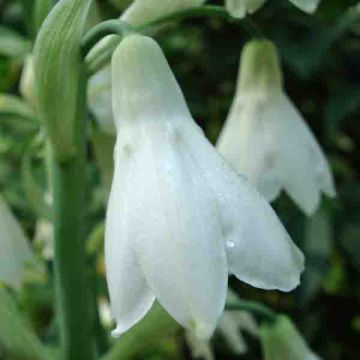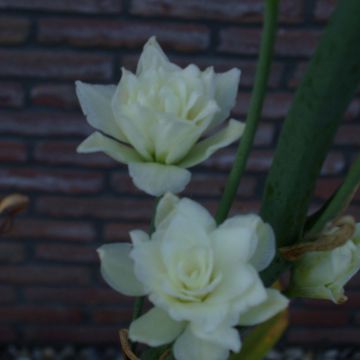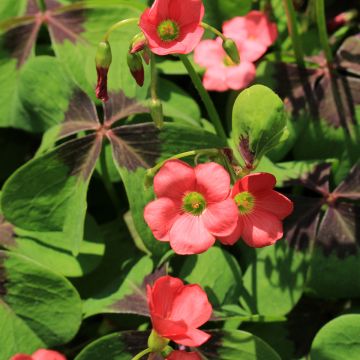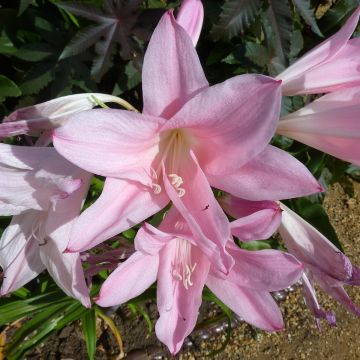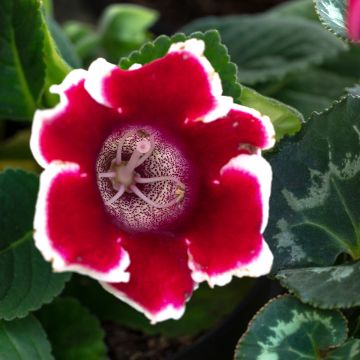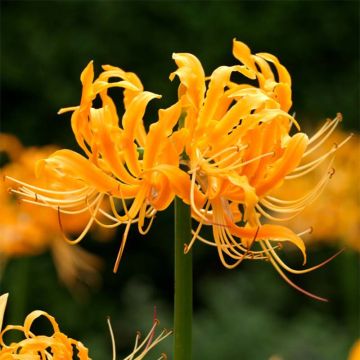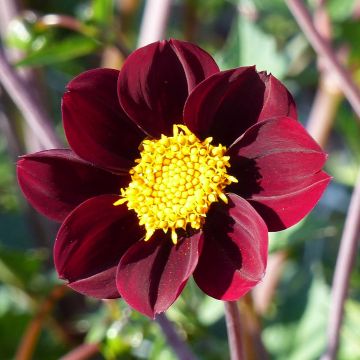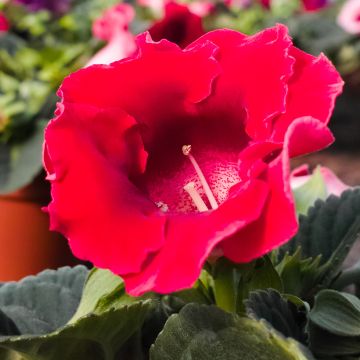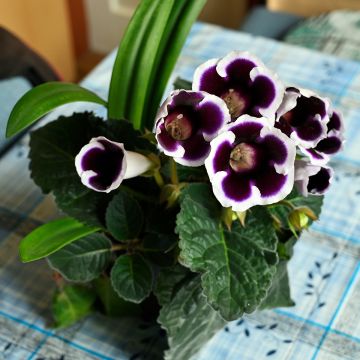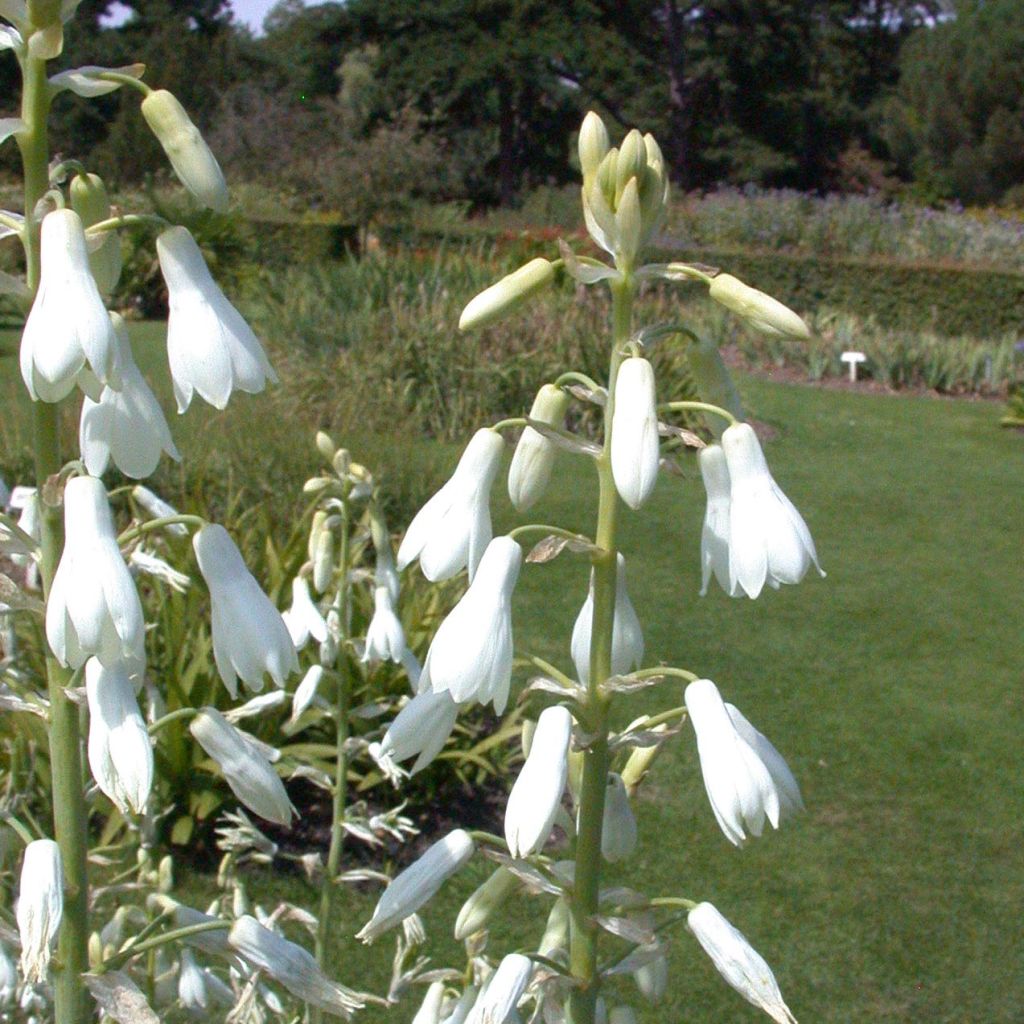

Galtonia viridiflora - Jacinthe du Cap verte
Galtonia viridiflora - Green-flowered galtonia
Galtonia viridiflora
Green-flowered galtonia
I received my flowers, nothing to complain about. The dwarf dahlias and Cape hyacinths that I planted immediately are doing well. And to my surprise, someone wished us a happy anniversary, which was very nice. Thank you, see you soon.
josette avril 2023, 24/04/2023
Special offer!
Receive a €20 voucher for any order over €90 (excluding delivery costs, credit notes, and plastic-free options)!
1- Add your favorite plants to your cart.
2- Once you have reached €90, confirm your order (you can even choose the delivery date!).
3- As soon as your order is shipped, you will receive an email containing your voucher code, valid for 3 months (90 days).
Your voucher is unique and can only be used once, for any order with a minimum value of €20, excluding delivery costs.
Can be combined with other current offers, non-divisible and non-refundable.
Why not try an alternative variety in stock?
View all →This plant carries a 6 months recovery warranty
More information
We guarantee the quality of our plants for a full growing cycle, and will replace at our expense any plant that fails to recover under normal climatic and planting conditions.
Would this plant suit my garden?
Set up your Plantfit profile →
Description
Galtonia viridiflora is a species of bellflower with green flowers. This charming South African bulb has strange and rare pale green bell flowers, sometimes edged with white, on long gracefully arching stems. Relatively hardy in well-drained soil, it likes sun, rich and moist soil in summer, and dry soil in winter. A simple and curious beauty, waiting to be discovered.
Galtonia viridiflora belongs to the hyacinth family and grows in mountainous regions in the east of South Africa. This bulb is shorter and stockier than Galtonia candidans. It is also earlier, often flowering in early July, and even hardier. It has decorative foliage in a semi-erect rosette, composed of long and wide lanceolate, slightly chalky, grey-green leaves. In the heart of summer, tall and arching flowering stems, reaching 90 cm (35in), are covered with large bell-shaped flowers inclined towards the ground. They are tubular, tender green, sometimes slightly edged with cream white and arranged regularly in a slightly dense floral spike.
Galtonia viridiflora is hardy down to -10C° and can be planted in the garden in the mildest regions, in a sunny and well-sheltered position. The bulb is particularly sensitive to excess water in winter, which is why it is important to provide good drainage in regions with wet winters. If in doubt, overwinter the bulb in a dry and frost-free place or grow it in a pot. Plant this Cape Hyacinth at the edge of a flowerbed, alongside kniphofias, crocosmias, and gladioli. Green inflorescences like this one are rare in the garden and deserve to be highlighted by purple or chocolate-coloured foliage.
Report an error about the product description
Galtonia viridiflora - Green-flowered galtonia in pictures
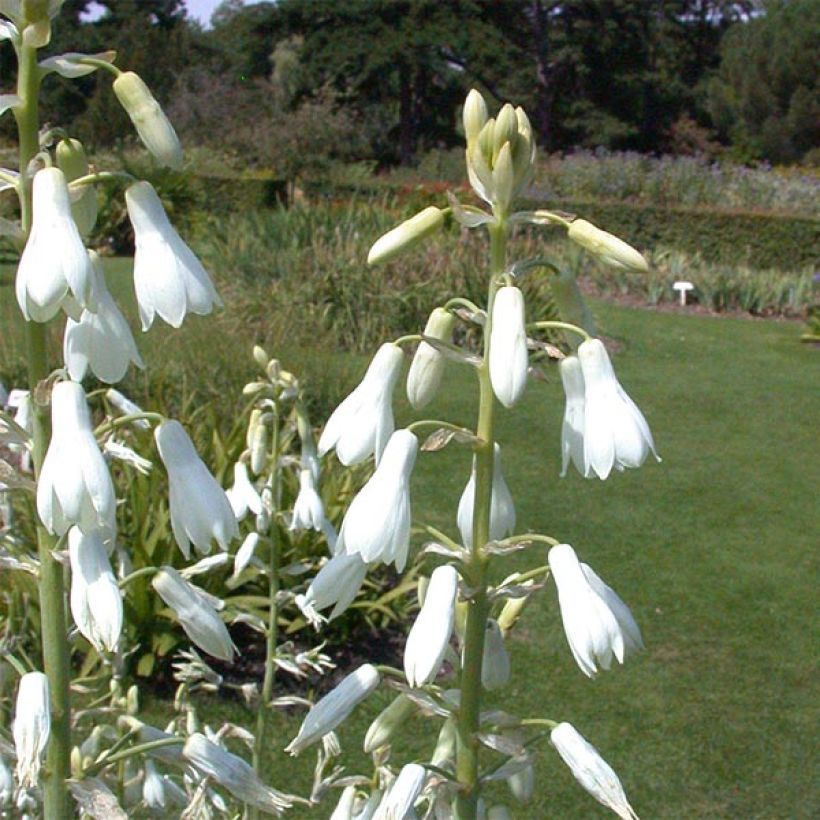

Plant habit
Flowering
Foliage
Botanical data
Galtonia
viridiflora
Hyacinthaceae
Green-flowered galtonia
South Africa
Planting and care
Plant the Galtonia viridiflora bulbs deeply, at a depth of 15 cm (6in) in rich and well-drained soil, spaced 15 cm (6in) apart. In heavy soil, plant the bulb in coarse sand or gravel. This bulb needs water during its growth, in the summer. However, moisture can be fatal to it in winter. As a result, outside the Mediterranean region, it will be better to dig up the bulbs at the end of the season and store them in an unheated room, in a container filled with sand. This plant is easy to grow in a pot with 1 bulb per pot with a diameter of 18 cm (7in). The plant is hardy to -10°C (14°F) in well-drained soils.
Planting period
Intended location
Care
-
, onOrder confirmed
Reply from on Promesse de fleurs
Similar products
Haven't found what you were looking for?
Hardiness is the lowest winter temperature a plant can endure without suffering serious damage or even dying. However, hardiness is affected by location (a sheltered area, such as a patio), protection (winter cover) and soil type (hardiness is improved by well-drained soil).

Photo Sharing Terms & Conditions
In order to encourage gardeners to interact and share their experiences, Promesse de fleurs offers various media enabling content to be uploaded onto its Site - in particular via the ‘Photo sharing’ module.
The User agrees to refrain from:
- Posting any content that is illegal, prejudicial, insulting, racist, inciteful to hatred, revisionist, contrary to public decency, that infringes on privacy or on the privacy rights of third parties, in particular the publicity rights of persons and goods, intellectual property rights, or the right to privacy.
- Submitting content on behalf of a third party;
- Impersonate the identity of a third party and/or publish any personal information about a third party;
In general, the User undertakes to refrain from any unethical behaviour.
All Content (in particular text, comments, files, images, photos, videos, creative works, etc.), which may be subject to property or intellectual property rights, image or other private rights, shall remain the property of the User, subject to the limited rights granted by the terms of the licence granted by Promesse de fleurs as stated below. Users are at liberty to publish or not to publish such Content on the Site, notably via the ‘Photo Sharing’ facility, and accept that this Content shall be made public and freely accessible, notably on the Internet.
Users further acknowledge, undertake to have ,and guarantee that they hold all necessary rights and permissions to publish such material on the Site, in particular with regard to the legislation in force pertaining to any privacy, property, intellectual property, image, or contractual rights, or rights of any other nature. By publishing such Content on the Site, Users acknowledge accepting full liability as publishers of the Content within the meaning of the law, and grant Promesse de fleurs, free of charge, an inclusive, worldwide licence for the said Content for the entire duration of its publication, including all reproduction, representation, up/downloading, displaying, performing, transmission, and storage rights.
Users also grant permission for their name to be linked to the Content and accept that this link may not always be made available.
By engaging in posting material, Users consent to their Content becoming automatically accessible on the Internet, in particular on other sites and/or blogs and/or web pages of the Promesse de fleurs site, including in particular social pages and the Promesse de fleurs catalogue.
Users may secure the removal of entrusted content free of charge by issuing a simple request via our contact form.
The flowering period indicated on our website applies to countries and regions located in USDA zone 8 (France, the United Kingdom, Ireland, the Netherlands, etc.)
It will vary according to where you live:
- In zones 9 to 10 (Italy, Spain, Greece, etc.), flowering will occur about 2 to 4 weeks earlier.
- In zones 6 to 7 (Germany, Poland, Slovenia, and lower mountainous regions), flowering will be delayed by 2 to 3 weeks.
- In zone 5 (Central Europe, Scandinavia), blooming will be delayed by 3 to 5 weeks.
In temperate climates, pruning of spring-flowering shrubs (forsythia, spireas, etc.) should be done just after flowering.
Pruning of summer-flowering shrubs (Indian Lilac, Perovskia, etc.) can be done in winter or spring.
In cold regions as well as with frost-sensitive plants, avoid pruning too early when severe frosts may still occur.
The planting period indicated on our website applies to countries and regions located in USDA zone 8 (France, United Kingdom, Ireland, Netherlands).
It will vary according to where you live:
- In Mediterranean zones (Marseille, Madrid, Milan, etc.), autumn and winter are the best planting periods.
- In continental zones (Strasbourg, Munich, Vienna, etc.), delay planting by 2 to 3 weeks in spring and bring it forward by 2 to 4 weeks in autumn.
- In mountainous regions (the Alps, Pyrenees, Carpathians, etc.), it is best to plant in late spring (May-June) or late summer (August-September).
The harvesting period indicated on our website applies to countries and regions in USDA zone 8 (France, England, Ireland, the Netherlands).
In colder areas (Scandinavia, Poland, Austria...) fruit and vegetable harvests are likely to be delayed by 3-4 weeks.
In warmer areas (Italy, Spain, Greece, etc.), harvesting will probably take place earlier, depending on weather conditions.
The sowing periods indicated on our website apply to countries and regions within USDA Zone 8 (France, UK, Ireland, Netherlands).
In colder areas (Scandinavia, Poland, Austria...), delay any outdoor sowing by 3-4 weeks, or sow under glass.
In warmer climes (Italy, Spain, Greece, etc.), bring outdoor sowing forward by a few weeks.






























